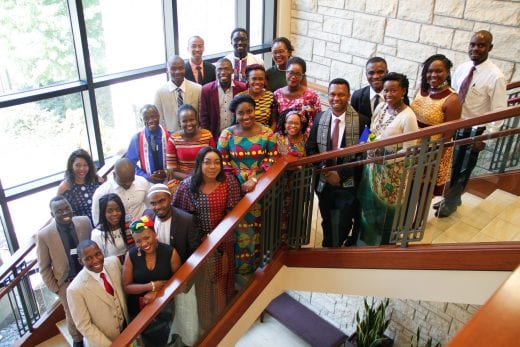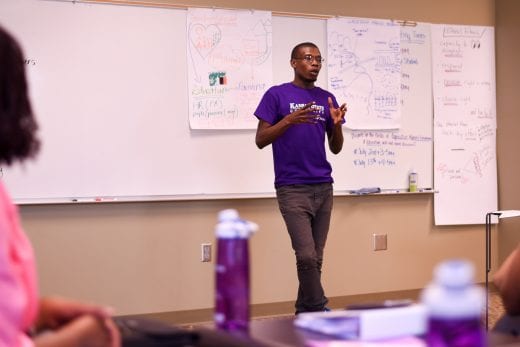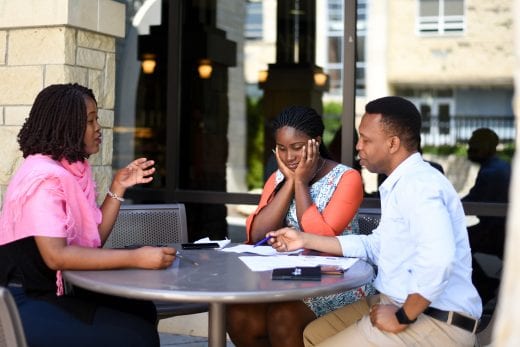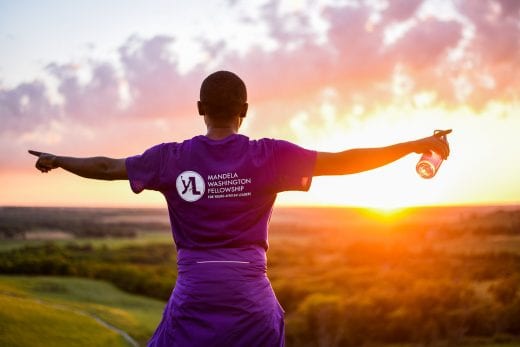In efforts of carrying on Nelson Mandela’s legacy of peace and service through leadership, the Mandela Washington Fellowship for Young African Leaders was launched in 2014 as the flagship program of Obama’s Young African Leaders Initiative (YALI.) The six-week leadership institute, sponsored by the U.S. State Department, provides an opportunity to 700 young emerging leaders from Sub-Saharan Africa to engage in professional development, academic sessions, networking, leadership training, community service, and additional cultural activities at a U.S. college or university.
On June 20, a group of 25 bright, young leaders from 21 different Sub-Saharan African countries began charting new soil in Manhattan, KS. Leaving behind their beloved ones, homes, and jobs, each Fellow came energized and ready to embark on a leadership journey that would leave them better equipped to work across borders to make the world a more just and flourishing home for humanity.
Campus and community partners gathered on June 22 to extend a warm Wildcat welcome to the Fellows at the opening reception hosted at the Staley School.
“At the official welcome reception, we felt like celebrities. People from diverse sectors had come to see us, interact with us, welcome us and make us feel at home. We loved the attention. This reception calmed our nerves, healed our anxieties, and re-fueled our hopes for the Fellowship,” shared Abigail Larbi from Ghana.
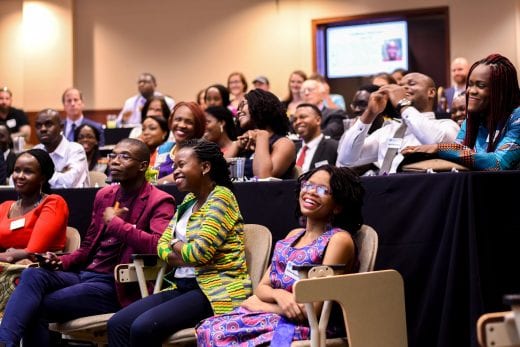
From the very beginning of the fellowship, one of the Mandela Washington Fellows from South Africa, Mafule Moswane, encouraged the cohort with the powerful statement, “the joy was, is, and will forever remain in the journey of our becoming.” The Fellows kept this statement at the forefront of their minds and found great joy in the journey of their becoming as they experienced personal growth and forged a meaningful community.
Authentic leadership was demonstrated daily, as the Fellows engaged in courageous conversations with one another and sought to know themselves and the world around them better through intensive training and leadership development. Through different modules and workshops, the Fellows were equipped with many tools to help drive their work in Africa and the world. They identified their top five strengths through the StrengthsQuest assessment, learned how to become effective coaches, developed 3-5 minute powerful Ignite Speeches that illustrated about their work and challenged the audience to help mobilize change, and cross-pollinated ideas and perspectives to make progress on complex challenges.
“I had not anticipated that at some point in my life I would have to travel to America to meet some of Africa’s greatest minds tackling Africa’s challenges head-on, the leaders who are fighting for peace in their countries, those who are fighting to bring end to genital mutilation, gender inequalities, economic inequalities and all forms of oppression as well as those who are bridging the educational and technological divide. What an honor to have met potential and current political leaders, business leaders and civil servants of Africa and her people. I am inspired by all these leaders who are contributing to the advancement of the human race and closing the existing gaps,” said Mafule.
When their agenda didn’t consist of meetings, workshops, and academic sessions, the Fellows were visiting with current and former Kansas State elected officials in Topeka, visiting and touring museums in Kansas City and Abilene, attending a workshop at the Kansas Leadership Center, attending city council meetings and panels, partaking in cultural experiences such as a Fourth of July celebration, taking in the serene beauty of Kansas by hiking the Konza Prairie, and working to leave a positive impact by volunteering with the Manhattan Special Olympics, helping with Furniture Amnesty Day, and in many other capacities. To say that the Fellows maximized their time during the Institute would be quite the understatement.
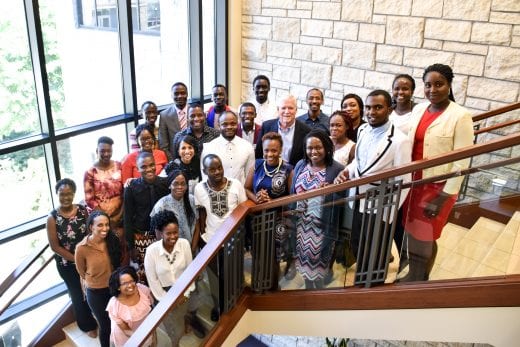
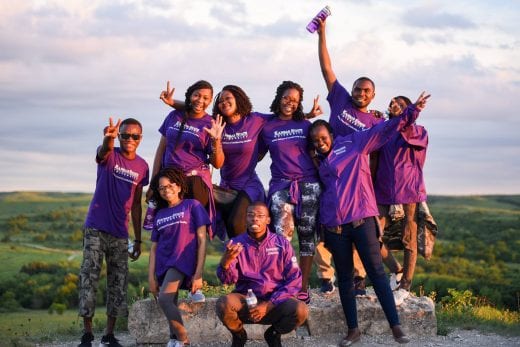
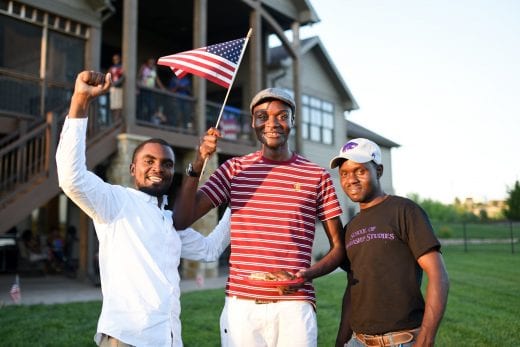
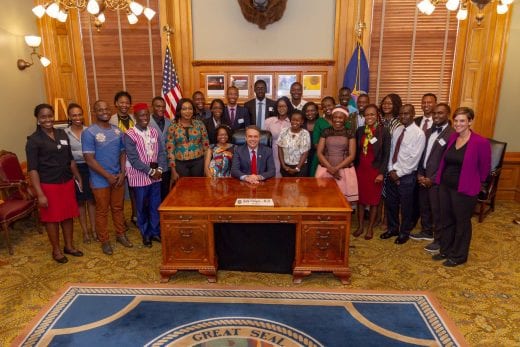
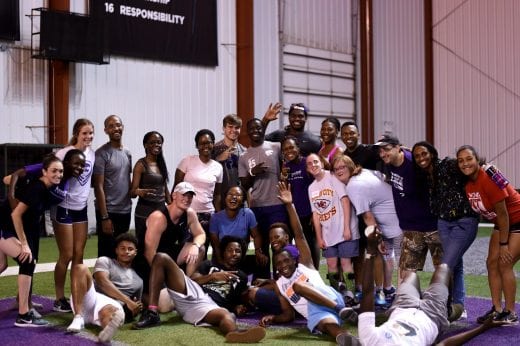
“Being a Mandela Washington Fellow has been the most pleasing experience of my life,” said Angelique Ingabire from Rwanda. “The overall fellowship activities were a high-level professional development process that has positively impacted my skills in civic engagement and responsibility. Beyond civic forums, the fellowship helped me make worthwhile connections and supporters of my work. Interacting with other civic leaders and hearing from their journeys was motivating and refreshing. The program elaborated on the real world application of impactful civic skills.”
“My K-State experience was a life-changing one. Today I see leadership in everything I do. Because of the Staley School of Leadership Studies, I understand that leadership is also all about creating strong and lasting relationships,” said Abdoul-halim from Comoros.
The unique perspectives, ideas, and experiences that each of the Fellows carried with them into the Institute helped to shape one cohesive community. The Fellows rallied behind each other’s initiatives, challenged each other’s thought processes, and helped to elevate each other to their highest potential.
“I appreciate how we were constantly in each other’s businesses. Whenever someone was down or seemed to withdraw, we would probe them to talk until they did,” Xatyiswa Maqashalala from South Africa said. “I also appreciated how we became a family, being honest with each other without hesitation or taking offense, in fact, it would just be a laughing matter just a few minutes after one of us had been put to order by another. The faculty gave us room and permission to lead just as we were. Everyone could lead regardless of their personality type.”
The work that was accomplished and the growth that was experienced amongst the Mandela Washington Fellows would not have been possible without the deep commitment of the Manhattan community. The Staley School would like to extend a sincere thank you to the City of Manhattan, the campus community, state and local officials, members of local nonprofits, civic organizations, and faith communities, and the peer network.
“The Institute would not be nearly as successful without the involvement of our community partners,” said Trisha Gott. “They bring critical skill sets and perspectives to the Institute, and act as windows into the Manhattan community. The beauty of leadership is that it is needed across sectors – public, private, and nonprofit, and we’re grateful for our partners who come together to make a successful Institute.”
Terry and Robbin Cole, members of the Manhattan community, crossed paths with a couple of the Fellows one Sunday morning. Just a few days later, the Manhattan couple generously extended an invitation to the Fellows to a backyard BBQ where they could meet individuals involved with the Manhattan Rotary Club.
“These were some of the most insightful, intelligent people I have ever met, yet even more, there was a humbleness and beauty that shined out from the inside of each and every one of them. A concern not so much for themselves, but for others and a hope to be a part of the change in the world for good,” Terry and Robbin Cole shared about the Fellows. The kindness and hospitality shown by the Cole’s depicts a beautiful illustration of the remarkable support of the entire Manhattan community.
“I was blown away by the reception, care, and commitment of the institute staff, in particular, the Staley School of Leadership at Kansas State University, the peer collaborators and members of the community. I am excited and looking forward to future collaborations with both the fellows and the institute staff in projects which will add value to our beloved society. The people I have met in the fellowship will remain the most beautiful and life-changing aspect of the fellowship. These are the very same people who continued to encourage us that, we can be better, that we can do better and we must not dare to give up. These are the people who have committed to lend a helping hand in our pursuit of greatness and journey of our becoming,” said Mafule Moswane.
Before embarking on the journey back home to their African countries, the Fellows convened in Washington, D.C. for the Mandela Washington Fellowship Summit. The Summit allowed for the Fellows to meet and network with the other 700 promising young leaders from Sub-Saharan Africa, as well as U.S. government, private sector, and civic leaders. “Leadership is a process. For one to be an effective leader, one must continuously perfect the art of leadership by building relationships and working together towards a common goal,” said Sweethurt Sambro from South Sudan.
“The Summit is electric. Having 700 change-makers in one room is powerful – the collaborations and leadership that emerge from the Summit are so energizing. We were incredibly proud of our cohort, they continued to care for each other and share what they had learned with others throughout the Summit,” said Kait Long.
Following the Summit, the Fellows departed from the U.S., feeling encouraged, energized, and empowered to implement their new knowledge and skills into their organizations and institutions that are mobilizing change across the continent of Africa.
“It hit me so hard after I left DC, I missed the other fellows and the faculty. However, I felt more empowered to deal with complex issues in adaptive ways, and this has helped me in supporting the clients in my host institution,” Anisah Amunega, from Nigeria, said. “I feel some level of trepidation returning to all that chaos back in Nigeria. But I am always conscious of the Mantra “ If not you, who? And if not now, when? So with the spirit of intentionality and purpose, I know I will courageously face the storm, and sail with a keen focus on contributing to making the world better as the day goes by, confident that I have a strong network that will continue to have a positive impact on me, my career, and my country.”
The Fellows and this program have impacted the Staley School deeply, through our faculty and also our students. “We are grateful for the relationships and learning that has come from the last three Civic Leadership Institutes. The Fellows exhibit leadership for the common good in every way we teach it – they truly walk the talk – and we are grateful for their commitment to making the continent, and our world, better,” said Kait.
“Everything started when we were in our home countries, three months ago, when we received the news that we were selected to be Mandela Washington Fellows,” Abdoul-halim Soule from Comoros shared at the Mandela Washington Fellowship Graduation Ceremony. “We are now more than 2018 Mandela Washington Fellows, we are family.”
After returning home to Tanzania, Ibrahim Yunus Rashid, shared this statement on behalf of the entire cohort, “We love you all as our own families because you have given us families across borders. You are the reason for our “why”, the timing of our “when”, the coaches of our “how”, the answers to our “what”. You will forever be in our hearts! We all aspire to make a positive change in our communities because once upon a time one said, “If not now, WHEN? If not us, WHO?” We look forward to living up to the Motto of Staley School of Leadership Studies, ‘Developing knowledgeable, ethical, caring, inclusive leaders for a diverse and changing world.”
View more photos from the Institute here.

